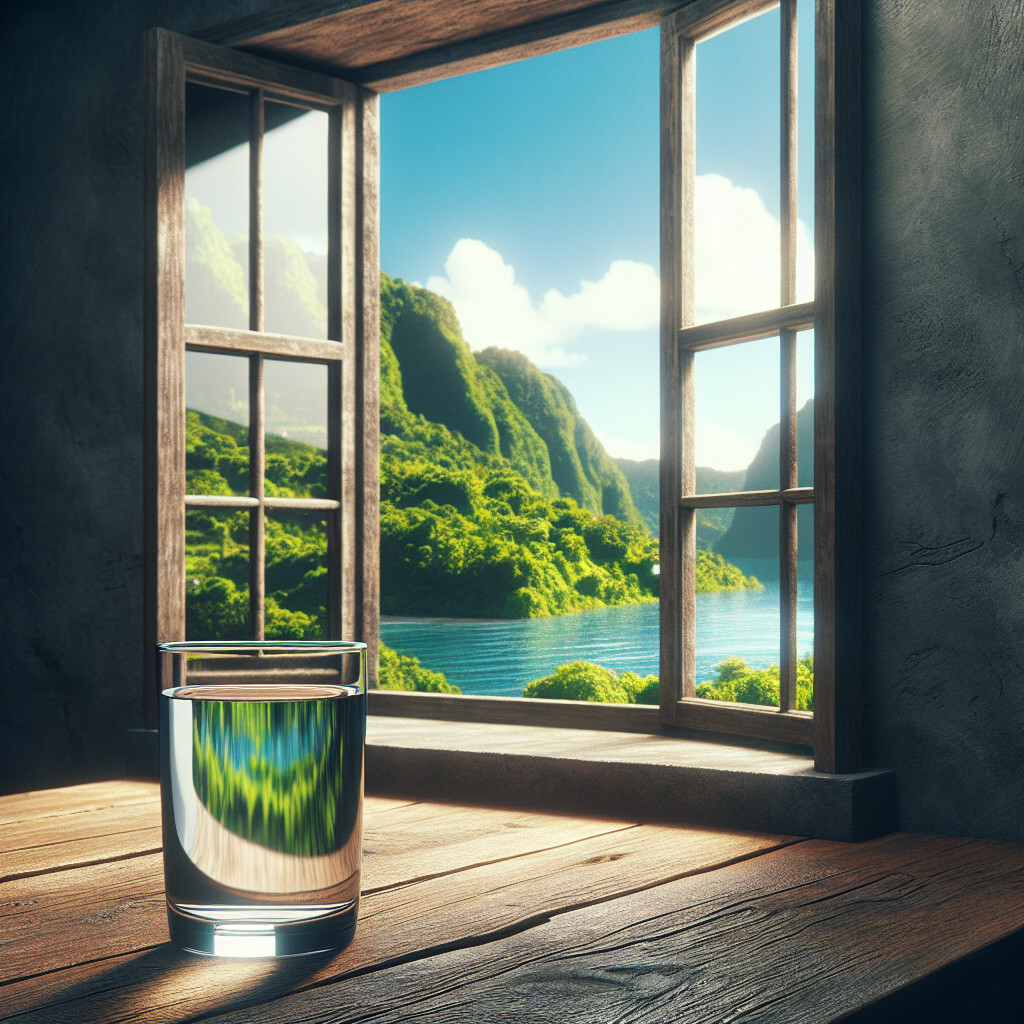-
Table of Contents
“Grenada’s Tap Water: Pure, Clean, and Refreshing Straight from the Source!”
Introduction

Grenada’s tap water is generally considered safe to drink as it is sourced from natural springs and treated to meet international standards. However, the quality can vary depending on the specific area and the condition of the local water infrastructure. Some residents and visitors choose to drink bottled water or use a water purifier for added assurance. It’s always recommended to check with local authorities or accommodations for the most accurate information.
Understanding the Quality of Tap Water in Grenada
Grenada, a picturesque island nation in the Caribbean, is renowned for its vibrant culture, stunning beaches, and lush landscapes. However, one aspect that often goes unnoticed is the quality of its tap water. Understanding the quality of tap water in Grenada is crucial for both residents and tourists, as it directly impacts health and well-being.
Grenada’s tap water is generally safe to drink, thanks to the country’s robust water treatment and distribution system. The National Water and Sewerage Authority (NAWASA) is responsible for managing the water supply in Grenada. They ensure that the water is treated and tested regularly to meet the World Health Organization’s (WHO) standards for potable water. The water treatment process involves filtration, disinfection, and sometimes, the addition of certain chemicals to kill bacteria and other harmful microorganisms.
However, the quality of tap water can vary depending on the location within the island. In urban areas like St. George’s, the capital city, the tap water is usually of high quality due to the advanced water treatment facilities. On the other hand, in some rural areas, the water quality might be slightly lower due to the lack of sophisticated water treatment systems. Nevertheless, the water is still generally safe to drink, although it is advisable to boil it first as an extra precaution.
The tap water in Grenada is sourced from various natural springs and rivers across the island. This means that the water is rich in minerals, which can give it a distinct taste. Some people might find this taste unusual, but it does not indicate that the water is unsafe to drink. In fact, these minerals can have various health benefits, such as strengthening bones and boosting the immune system.
Despite the generally good quality of tap water in Grenada, there are occasional issues that can affect its safety. For instance, during the rainy season, there can be an increase in waterborne diseases due to the contamination of water sources. In such cases, NAWASA usually issues a boil water advisory to ensure public safety. Additionally, the island’s aging water infrastructure can sometimes lead to problems like pipe leaks, which can also affect the water quality.
To ensure the safety of the tap water, NAWASA conducts regular water quality tests. These tests check for various parameters, including the presence of harmful bacteria, the pH level, and the concentration of different minerals. The results of these tests are made public, providing transparency and reassurance about the safety of the tap water.
In conclusion, the tap water in Grenada is generally safe to drink, thanks to the rigorous water treatment processes and regular testing conducted by NAWASA. However, the quality can vary depending on the location and the time of year. Therefore, it is always advisable to stay informed about the current water quality and to take necessary precautions, such as boiling the water, especially during the rainy season. Despite these minor issues, the tap water in Grenada is of a high standard, contributing to the overall health and well-being of its residents and visitors.
The Impact of Infrastructure on Grenada’s Tap Water
Grenada, a small island nation in the Caribbean, is known for its vibrant culture, stunning beaches, and lush landscapes. However, one aspect of life in Grenada that often goes unnoticed is the quality of its tap water. The infrastructure of Grenada plays a significant role in determining the quality of the tap water, and it is a topic that deserves attention.
The water infrastructure in Grenada is a complex system that includes water treatment plants, pipelines, and storage facilities. The government of Grenada, through the National Water and Sewerage Authority (NAWASA), is responsible for the provision and management of water services in the country. Over the years, the government has made significant investments in improving the water infrastructure, which has had a positive impact on the quality of tap water.
One of the key factors that influence the quality of tap water in Grenada is the source of the water. The majority of the tap water in Grenada comes from surface water sources such as rivers and reservoirs. These sources are susceptible to contamination from various factors such as agricultural runoff, industrial waste, and natural disasters. However, the government has implemented stringent water treatment processes to ensure that the tap water is safe for consumption. These processes include filtration, disinfection, and chemical treatment, which effectively remove harmful contaminants from the water.
The condition of the water distribution system also plays a crucial role in determining the quality of tap water. In Grenada, the water distribution system consists of a network of pipes that transport water from the treatment plants to households and businesses. Over time, these pipes can deteriorate due to factors such as age, corrosion, and ground movement, which can lead to leaks and contamination of the water. To address this issue, the government has embarked on a program to replace old and damaged pipes, which has significantly improved the quality of tap water.
Despite these efforts, there are still challenges that affect the quality of tap water in Grenada. One of these challenges is the lack of consistent access to tap water in some parts of the country. This is mainly due to the uneven distribution of water resources and the high cost of extending water infrastructure to remote areas. In these areas, residents often rely on rainwater harvesting or bottled water for their daily needs.
Another challenge is the impact of climate change on water resources. Grenada, like many other small island nations, is vulnerable to the effects of climate change, including changes in rainfall patterns and increased frequency of extreme weather events. These changes can affect the availability and quality of water resources, which in turn affects the quality of tap water.
In conclusion, the quality of tap water in Grenada is largely influenced by the state of the country’s water infrastructure. While significant strides have been made in improving the water infrastructure, there are still challenges that need to be addressed. The government of Grenada, in collaboration with international partners, is committed to addressing these challenges and ensuring that all residents have access to safe and clean tap water.
Health Implications of Drinking Tap Water in Grenada
Grenada, a picturesque island nation in the Caribbean, is renowned for its vibrant culture, stunning beaches, and lush landscapes. However, one aspect that often raises questions among visitors and even locals is the quality of tap water. The health implications of drinking tap water in Grenada are a topic of considerable interest and importance.
Grenada’s tap water is generally safe to drink, thanks to the country’s rigorous water treatment processes. The National Water and Sewerage Authority (NAWASA) is responsible for the provision and management of safe and reliable water and sewerage services in Grenada. NAWASA ensures that the water supplied meets the World Health Organization’s (WHO) guidelines for drinking water quality. The water undergoes a comprehensive treatment process, including filtration and disinfection, to eliminate potential contaminants.
However, despite these stringent measures, there can be occasional issues with the tap water, primarily due to the country’s geographical location and climate. Grenada, being a tropical island, is prone to heavy rainfall, which can sometimes lead to water contamination. Runoff from the rain can carry pollutants into the water supply, affecting its quality. Moreover, the island’s infrastructure, including its water pipes, can be affected by natural disasters such as hurricanes, leading to potential contamination.
It’s also worth noting that the quality of tap water can vary across different parts of the island. While the water in urban areas is typically well-treated and safe to drink, some rural areas may have less reliable water quality due to less frequent testing and maintenance of water sources. Therefore, it’s advisable for those living in or visiting these areas to take additional precautions, such as boiling water before consumption or using water purification tablets.
Drinking contaminated water can have several health implications. It can lead to waterborne diseases such as cholera, typhoid, and dysentery, which are caused by bacteria, viruses, or parasites in the water. These diseases can cause symptoms ranging from mild gastrointestinal discomfort to severe dehydration and, in extreme cases, can be life-threatening.
Furthermore, long-term consumption of contaminated water can lead to chronic health issues. For instance, if the water contains high levels of harmful chemicals or heavy metals, it can lead to conditions like kidney damage, cardiovascular problems, and neurological disorders.
To mitigate these risks, it’s crucial to stay informed about the quality of tap water in your area. Regular updates about water quality are usually provided by NAWASA and local health departments. If there’s any doubt about the water’s safety, it’s better to err on the side of caution and use bottled water or other safe water sources.
In conclusion, while the tap water in Grenada is generally safe to drink, occasional issues can arise due to environmental factors and infrastructure challenges. Therefore, it’s essential to stay informed about the water quality in your area and take necessary precautions when needed. By doing so, you can ensure that you’re protecting your health and that of your family, while enjoying all the beauty and charm that Grenada has to offer.
Sustainability and the Future of Tap Water in Grenada
Grenada, a small island nation in the Caribbean, is known for its vibrant culture, stunning beaches, and lush rainforests. However, one aspect of life in Grenada that often goes unnoticed is the quality of its tap water. The sustainability and future of tap water in Grenada are topics of great importance, as they directly impact the health and well-being of the island’s residents and visitors.
The quality of tap water in Grenada is generally good, thanks to the country’s abundant natural water resources and the government’s efforts to maintain and improve the water infrastructure. The island’s water supply primarily comes from surface water sources, such as rivers and reservoirs, which are replenished by the country’s high annual rainfall. This water is then treated and distributed to households and businesses through a network of pipes and pumping stations.
However, despite these positive aspects, there are still challenges to be addressed. One of these is the issue of water contamination. Although the water treatment process removes most contaminants, some can still make their way into the tap water. These include bacteria, viruses, and chemicals from agricultural runoff and industrial waste. While the risk of serious health problems from these contaminants is low, it is still a concern that needs to be addressed.
Another challenge is the aging water infrastructure. Many of the pipes and pumping stations in Grenada were built decades ago and are in need of repair or replacement. This can lead to leaks and disruptions in the water supply, which can be inconvenient and potentially harmful to health. The government is aware of this issue and has been investing in infrastructure upgrades, but progress has been slow due to financial constraints.
Looking to the future, the sustainability of Grenada’s tap water is a key concern. As the effects of climate change become more pronounced, the island could face changes in rainfall patterns, rising sea levels, and more frequent and severe storms. These could all impact the availability and quality of tap water. To address this, the government and other stakeholders are exploring various strategies, including water conservation measures, the use of renewable energy in water treatment and distribution, and the development of climate-resilient infrastructure.
In addition, there is a growing recognition of the need to involve local communities in water management. This includes educating residents about the importance of water conservation and providing them with the tools and knowledge to use water more efficiently. It also involves giving communities a say in decisions about water infrastructure and policies, to ensure that these meet their needs and priorities.
In conclusion, while the tap water in Grenada is generally of good quality, there are challenges that need to be addressed to ensure its sustainability for the future. These include issues of water contamination and aging infrastructure, as well as the impacts of climate change. However, with the right strategies and the involvement of local communities, it is possible to overcome these challenges and secure a safe and sustainable water supply for all residents and visitors of Grenada.
Q&A
1. Question: Is the tap water in Grenada safe to drink?
Answer: Yes, the tap water in Grenada is generally considered safe to drink.
2. Question: What is the quality of tap water in Grenada?
Answer: The quality of tap water in Grenada is good as it is treated and purified before distribution.
3. Question: Are there any common issues with the tap water in Grenada?
Answer: There are no common issues with the tap water in Grenada, but during the rainy season, there may be slight turbidity.
4. Question: Do I need to boil the tap water before drinking in Grenada?
Answer: No, it is not necessary to boil the tap water before drinking in Grenada as it is treated and considered safe for consumption.
Conclusion
The tap water in Grenada is generally safe to drink as it meets World Health Organization standards. However, due to occasional inconsistencies in water treatment, visitors are often advised to drink bottled water.






